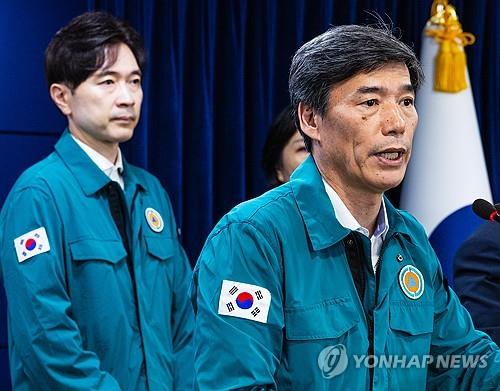- California Assembly OKs highest minimum wage in nation
- S. Korea unveils first graphic cigarette warnings
- US joins with South Korea, Japan in bid to deter North Korea
- LPGA golfer Chun In-gee finally back in action
- S. Korea won’t be top seed in final World Cup qualification round
- US men’s soccer misses 2nd straight Olympics
- US back on track in qualifying with 4-0 win over Guatemala
- High-intensity workout injuries spawn cottage industry
- CDC expands range of Zika mosquitoes into parts of Northeast
- Who knew? ‘The Walking Dead’ is helping families connect
S. Korea says Fukushima water release carried out as planned
Japan’s release of contaminated water from the crippled Fukushima nuclear power plant has been carried out stably and as planned, with no abnormalities detected so far, a South Korean official said Friday.
Tokyo initiated the discharge of contaminated water a day earlier, a process expected to span more than three decades, despite lingering health and environmental concerns from neighboring countries.
“So far, the discharge is proceeding stably as originally planned, and it is understood that there are no abnormal situations,” said Park Ku-yeon, the first deputy chief of the Office for Government Policy Coordination, during a daily briefing on the Fukushima issue.
Park also emphasized that the Seoul government is thoroughly monitoring and analyzing the ocean discharge process through a “double hotline” between the regulatory and diplomatic authorities of the two countries. The two sides earlier agreed to swiftly share information in case of an abnormal situation at the discharge facilities.
“The government will take its best measures to continue monitoring so that there will be no impact on people’s safety and health,” Park said.
Tokyo Electric Power Co. (TEPCO), the plant’s operator, the International Atomic Energy Agency and the Korea Institute of Nuclear Safety have each begun uploading data regarding the discharge to their respective websites, according to Park.
Noticeably, TEPCO uploads more detailed data on an hourly basis, such as the radiation levels, the flow rate of discharge and the level of tritium, a hydrogen radioisotope known to still be detectable even after treatment through a custom purification system known as ALPS.












